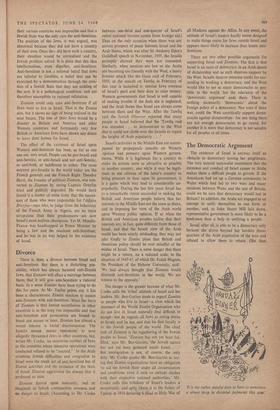Divorce
There is, then, a divorce between Israel and anti-Semitism. But there is a disturbing pos- sibility, which has always haunted anti-Zionist Jews, that Zionism will effect a marriage between them, that it will give anti-Semitism a rational basis. In a sense Zionists have been trying to do this for years. As Mr. Taylor points out, it has been a characteristic Zionist reaction to equate anti-Zionism with anti-Semitism. Since the basis of Zionism is that Jewish assimilation in other countries is in the long run impossible and that anti-Semitism and persecution are bound to break out sooner or later, Zionism has almost a vested interest 'n racial discrimination. The Israelis mount rescue operations' to save allegedly threatened Jews in other countries, but, writes Mr. Cooke, 'an enormous number of Jews in the countries where intensive operations were conducted refused to he "rescued."' In the Arab countries Jewish difficulties and emigration to Israel were the result riot of anti-Semitism but of Zionist activities and the existence of the State of Israel. Zionism aggravated the disease that it professed to cure.
Zionism thrivas upon insecurity, real or imagined, in Jewish communities overseas and on danger to Israel. (According to Mr. Cooke between one-third and one-quarter of Israel's entire national income comes from foreign aid.) Thus on the only occasion when there was any serious prospect of peace between Israel and the Arab States, which was after Sir Anthony Eden's Guildhall speech in November, 1955, the Israelis promptly showed they were not interested. Similarly, when tensiuns are low or the Arabs are becoming too friendly with the West, a heavy frontier attack like the Gaza raid of February, 1955, or the assault in Tawfiq in February of this year is launched tc. remind Jews overseas of Israel's peril and their duty to raise money; Western governments that Israel is well capable of making trouble if she feels she is neglected; and the Arab States that Israel can always come between them and the West. After the Tawfiq raid the Jewish Observer reported that many people in Israel believed that the `Tawfiq raid was intended . . . to demonstrate to the West that it could not climb over the Israelis to regain the heights of Arab popularity . .
Israel's activities in the Middle East are accom- panied by propaganda assaults on Western opinion and pressure upon Western govern- ments. While it is legitimate for a country to make its actions seem as attractive as possible to another country, ano wh:le it may be legiti- mate to use citizens of the latter's country to bring pressure to bear upon its government, it is a game which may lead to considerable un- popularity. During the last few years Israel has to a remarkable extent succeeded in making the British and American people believe that her interests in the Middle East are the same as theirs, and in imposing her view of the Arab world upon Western public opinion. If or when the British and American peoples realise that their interests are, in fact, quite different from those of Israel, and that the Israeli view of the Arab world has been utterly misleading, they may not take kindly to Zionist pleas that British and American policy should be ever mindful of the wishes of Israel. There is some danger that there might be a return, on a reduced scale; to the situation of 1945-47, of which Dr. Judah Magnes, the President of the Hebrew University, said: 'We had always thought that Zionism would diminish anti-Semitism in the world. We are witness to the opposite.'
The danger is the greater because of what Mr. Cooke calls the 'tribal' attitude of Israel and her leaders. Mr. Ben-Gurion tends to regard Zionists as people who live in Israel—a view which the members of the World Zionist Organisation who do not live in Israel naturally find difficult to accept—but he regards all Jews as owing duties to Israel, and he has said that his first loyalty is to the Jewish people of the world. The chief task of Zionism is the ingathering of the Jewish people to Israel. 'Zionism has not yet been ful- filled,' says Mr. Ben-Gurion, 'the Jewish nation has not yet been gathered inside Israel. . . But immigration is not, of course, the only duty. Mr. Cooke quotes Mr. Ben-Gurion as say- ing that Zionist organisations have an obligation 'to aid the Jewish State under all circumstances and conditions, even :f such an attitude clashes with their respective national authorities.' Mr. Cooke calls this tribalism of Israel's leaders a monstrosity, and aptly likens it to the Sultan of Turkey in 1914 declaring a jihad or Holy War of all Moslems against the Allies. In any event, the attitude of Israel's leaders hardly seems designed to make things easier for Jews outside Israel and appears more likely to increase than lessen anti- Semitism.
There are two other possible arguments for supporting Israel and Zionism. The first is that Israel is an oasis of democracy in an Arab desert of dictatorship and as such deserves support by the West. Israelis deserve immense credit for suc- ceeding in working a democracy, and the West would like to see as many democracies as pos- sible in the world, but the relevance of the 'democratic argument' ends there. There is nothing necessarily 'democratic' about the foreign policy of a democracy. Nor even if there was, could the West uncritically support demo- cracies against dictatorships: for one thing there are not enough democracies to go round, for another it is more that democracy is not suitable for all peoples at all times.




















 Previous page
Previous page